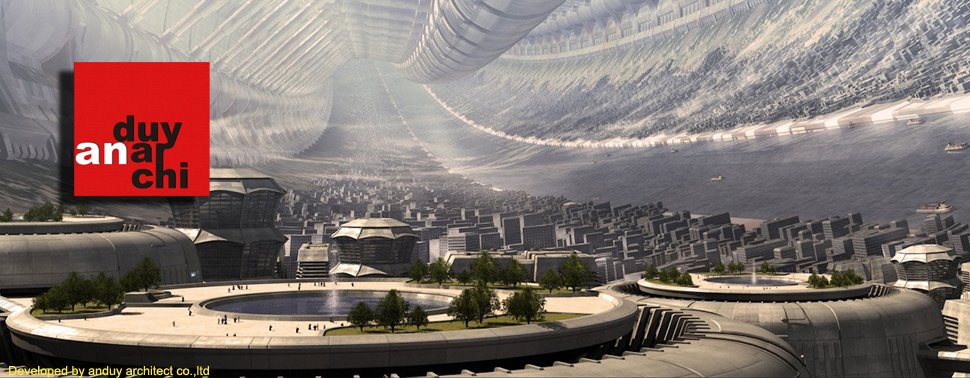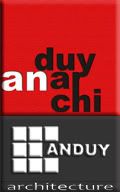
German architects Archimedialab have completed a visitor centre and administration building beside at incineration plant in Stuttgart.

The ZMS Schwandorf Administration Building forms part of a 450 metre landscaped noise barrier.

Materials include exposed concrete, laminated timber beams and aluminum cladding.

Here’s some more information from Archimedialab:
–
Administration Building and Master Plan for ZMS Schwandorf Incineration Plant

The task to design a new administration building, reorganize the power station compound and create a new noise protection barrier gave us the chance to dissolve the dichotomy of landscape and building to realize the deconstruction of those categories into one designed environment, to be experienced in a dynamic and curious fashion:

Built Landscape
450m long and up to 13m high, the central part of a noise protection wall with a 45 degree incline simultaneously constitutes our new administration building for over 140 m. The superimposition of building and earth wall allows us to explore and experience the landscape of this entire ensemble on various levels.

An auditorium with a visitor center unfolds from this landscape and opens up towards the power station compound. It separates from the earth wall on the upper level, resting on two radial supporting walls and cantilevers up to 20 m over the landscape. A long panoramic glass façade leans towards the power station.

The administration building underneath is sculpted into the earth wall. Meeting rooms and common areas penetrate through the wall to establish a relationship with the bordering village of Dachlhofen. The grass covered roofs of the power station workshops in south form the extension of our landscape.

MATERIALS
As for the part of the building that is situated within the core of the earth wall, a basic structure of exposed concrete is supplemented with built in furniture elements in colored MDF, wooden oak floors, and brightly painted magnesia-bonded panels for acoustic absorption on walls and door elements. Part of the exposed concrete is stained in bright colors to contrast the archaic look of the untreated concrete. Profiled glass walls allow daylight to penetrate far into the building.

All meeting and conference rooms are enclosed in frameless glass walls. The light timber structure of the upper glue-lam shell remains exposed, the diamond shaped curvilinear spaces between them are filled with acoustic panels stained in a dark purple color.

Most of the north side of the building is covered in vegetation, yet three aluminum clad meeting rooms project through the earth wall and cantilever over the slope. The southern façade with most of the offices, opens towards the power station with a band of windows resting on gabion retaining walls in dark basalt evolving out the adjacent landscape. Some of these gabion walls even penetrate into the foyer of the building.

STRUCTURE
The main structural challenges arose from the fact that we had to create an earth wall of up to 13 m height that is capable of supporting not only itself at a 45 degree slope, but also to accommodate a building within it, situated at about 6 meters above grade. It was very important to cover the building in landscape and vegetation that appears to be continuous and without indication of the shape of the building underneath.

A specially engineered and carefully balanced mixture of earths with fine aggregate and a very low percentage cement for adhesion ensures the stability of the earth wall structure, yet allows enough water to be retained to let vegetation cover the structure completely and evenly. A large portion of the building is covered with up to 6 m of the earth wall. Here the core of earth wall is built up with geo-blocks to reduce the weight of the earth wall. All this is covered with the same earth mixture and vegetation.

The upper floor of the building folds out of the wall and cantilevers up to 20 m over the upper level of the site. A pre-stressed concrete structure, initially supported by two curvilinear walls allows the auditorium and visitor center to hover over the site to allow panoramic views of the entire area. A lightweight structure of diagonally braced glue-lam beams forms the upper shell of this part.

This structure continuously evolves in shape and form, with the entire shape of the CNC milled beams following the always changing geometry of the building. A skin from 2 layers of 34mm boards bent into form and nailed at 10 degree angles to each other helps to create a very stiff shell in combination with the glue-lam beams. The entire timber structure was produced file-to-factory from 3D-plans.

Most of the materials evolve from the surrounding landscape, the industrial scape of the power station nearby and the cultural heritage of the former aluminum works on the site. For the uninitiated viewer it will be hard to discern in some places, where the actual building starts and where the earth structure does not bear any construction. Landscape features are incorporated into the building, built structures generate a new landscape. Simple and archaic spaces are contrasted with clearly artificial, refined and crafted surfaces.

Archimedialab is full service architecture + design laboratory aiming to combine unconventional spatial explorations with ecological and innovative technologies to create unique architectural solutions in all phases of the design and construction process. The main focus is on concept and design and construction of cultural and public institutions, hotels and conference facilities, housing, landscape design, urban planning and commercial design worldwide.
–


